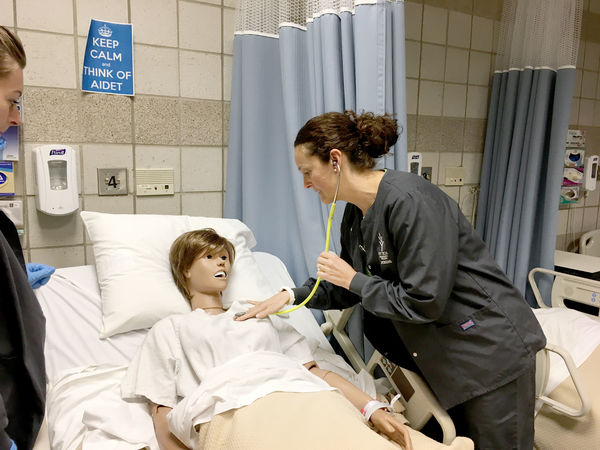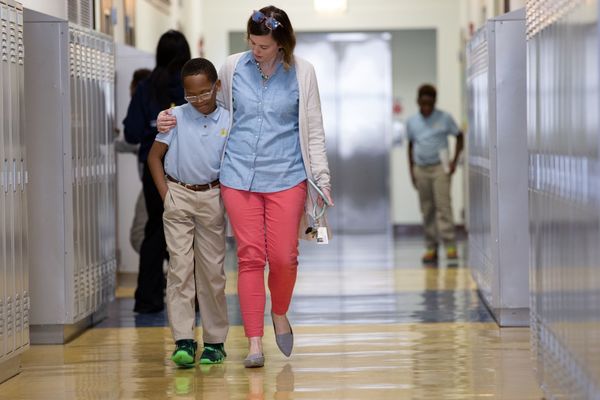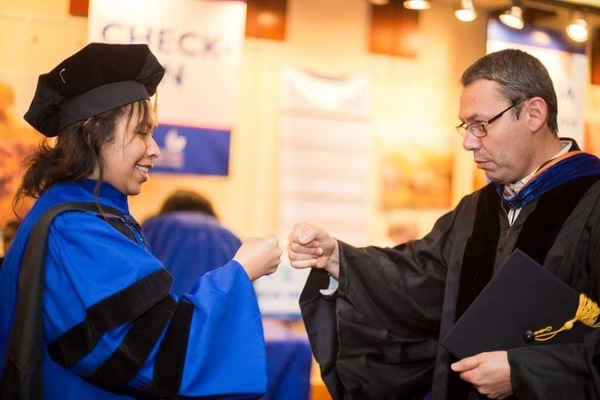In the Jewish faith, donating time, talent, and money to those in need is a sacred obligation. It’s an opportunity not only to strengthen communities, but also to work and grow towards grace. The practice of tzedakah, a word derived from the Hebrew word for “justice,” governs Jewish giving. It defines eight levels of charity, with each level higher and more honorable than the one before it.
Practicing tzedakah asks more of charity. It uplifts the poor, perfects the giver, and most importantly transforms the system. Here at LEO, we view rigorous economic research in the same light: tzedakah says the kind of charity we practice matters, and we believe the kind of research we practice matters. And just as tzedakah begins with the attitude of the giver, upholding our commitment to high-quality, impactful research starts with our economists.
In giving well, givers become higher versions of themselves. And so it is with research. Practicing good, meaningful research provides academics and researchers with purpose and perspective. But closely integrating research and social justice is a unique calling, especially for academics who often have to choose between full-time research and tenure-track professorships. Many of LEO’s researchers and affiliates took winding paths before finding their home at LEO.

LEO research faculty Sarah Kroeger, reflecting on the beginning of her career at an asset management firm, said that everyone she worked for had “economist” behind their name.
“They asked interesting questions, but I found I wanted to go deeper into the answers than they did,” she said. “They were asking questions about what economic sectors would be growing. Not to say these questions weren’t important, but I realized I was interested in different kinds of questions.”
Patrick Turner, also LEO research faculty, described a similar journey.
“I studied finance economics as an undergraduate and worked for a time at a financial services company. I was good at coding up data, programming, data analysis, that sort of thing. But I felt my skills weren’t being used for a broader, higher-serving purpose.”
Then came LEO. By engaging in research with social service providers and building trust, connection, humility, and the potential for immediate change on the ground, LEO economists match their quantitative skills with a fierce commitment to the common good.
“LEO gives me the opportunity to serve others and use my skills in a way that can help other people,” Patrick says.
And economists are well-positioned to ignite change.
“Economists have a really good framework for thinking about how people make choices, how organizations make choices, and how the world operates,” said Patrick. “Some of the hard and important questions haven’t been answered yet and sometimes aren’t as prioritized.”
So LEO researchers are asking the hard questions. And they’re bringing others on board. Today, LEO actively engages a network of more than 50 faculty affiliates—which means our work isn’t only deepening our own researchers, but it’s also influencing the perspectives and priorities of economists across the country.
LEO faculty affiliate Kirk Doran, Henkels Family Collegiate Chair and Associate Professor at the University of Notre Dame, said his interest in LEO was spurred by LEO’s ambitious vision of winning the fight against poverty.
“The main thing that led me to become a LEO faculty affiliate was a desire to be part of a great team that actually has a chance to figure out what reduces poverty and what doesn’t,” he said. “That’s a difficult thing to figure out, and it takes a great team and a great set of strategies to be able to pull that off. I think LEO has both.”
Together, we’re learning. But combining rigorous economic research with social service isn’t exactly easy—and neither is solving poverty.
“The saying I like is ‘half of what we know is wrong, we just don’t know which half,’” said Rusty Tchernis, another LEO faculty affiliate and Associate Professor of Economics in the Andrew Young School of Public Policy Studies at Georgia State University.
“It’s completely different from what I was doing in the past,” he said, reflecting on his work with social service providers. “I’m learning a lot. It seems like people at nonprofits are very emotionally driven, so in a way it’s very different from academia. They’re not necessarily motivated by money—it’s almost exactly the opposite. I’m learning how to walk in both worlds.”
While LEO’s research model is an outlet for mission-oriented economists, its main customers are social service providers and county governments. But, for even the most innovative of these agencies, engaging in economic research takes courage.
“If you’re really going to do [a randomized controlled trial] and figure out whether what you’re doing works, there’s a non-zero chance that it’s not working. And it takes a lot of guts to take that chance,” says Ethan Lieber, LEO faculty affiliate and Associate Professor of Economics at Notre Dame. “Putting your money where your mouth is to figure out ‘Are we doing this right? Can we do it better?’ is something really admirable.”
For many LEO partners, building evidence is high on the list of priorities. Knowing their work is having a real, lasting impact on the lives of those they serve not only brings peace of mind, but it can also bring opportunities for additional growth and funding. Still, connections to top-tier researchers and the expertise needed for rigorous, economic evaluations are often out of reach.
That’s the magic of LEO. By bringing providers and leading economists together in the same space, economists can find interesting, meaningful research questions and providers can build the evidence they need.
Kirk Doran recently attended his first LEO workshop, where service providers are connected with economists. “I was just amazed at how the LEO team managed to break down all of the things that need to happen to build a partner relationship and turn it into something that can lead to valuable research,” he said. “These are things we do intuitively as research economists, but LEO does it non-intuitively. They do it so consciously that non-researchers are able to understand what’s happening and can participate fully.”
A high level of partner interest and participation is critical for successful research. It’s also inspiring. After working with LEO economists over a number of months to design a research project, service providers are invited to present their project design to their LEO research team and other philanthropists and economists from around the country. Designing a research study is often a demanding journey. Here, providers find a space to present and celebrate their work before officially launching their study.

For researchers like Patrick Turner—who acknowledged the necessary but unglamorous work of weekly phone calls, mapping out research designs, and analyzing data—it’s these presentations that are the most rewarding.
“I’ve always been moved by the presentations organizations give when they take ownership of the partnership we’ve been cultivating for months,” he said. “Seeing them up there and taking ownership of their project is really inspiring.”
It’s these moments that ground him in his pursuit of research that serves.
“While I’m not doing the direct work on the ground, I support and try to shine a light on the organizations that are doing really impactful work.”
But, like tzedakah, impactful research doesn’t stop at fulfilling economists and improving the capabilities of service providers. For LEO, it works to ensure individuals’ independence before they lose it. It transforms the system. It establishes justice. LEO's research is best defined by how we use it.
“It’s so important to build a just society and make the effort to ensure all of our work, our research, our teaching leads to that goal,” says Kirk Doran. “One of the missing pieces to building a just society is knowledge, and we can make the sacrifice of putting in the hours and putting in the time and putting in the effort over years of our lives to humbly and slowly and surely build that knowledge.”
For Sarah Kroeger, whose research today focuses on the economics of domestic violence and household labor allocation, building a just society and transforming the system requires a deeper understanding of it.
“Domestic violence is most common among low-income, low-education households. And children are most likely to be removed from their homes on abuse charges because their mothers choose abusive partners over them,” she said. “But why do they do that?”
Similarly for Ethan Lieber, who’s currently working to map the development and consequences of the opioid epidemic, the most important economic questions are about social good.
“Some of what I do is public economics. And I think the question there is really about social welfare,” he said. “How do we make people as well-off as possible given the constraints we face? What LEO is doing lines up with that in a very immediate way.”
But for Rusty Tchernis, the role of economists goes a step further. After building knowledge, the most important step is to drive change. Which means landing it on the desks of policymakers.
“Daniel Kahneman—a Nobel Prize winner in economics despite the fact that he’s never taken an econ class—has a saying: ‘If you want to change the world, hang out with economists,’” said Rusty, whose main research interests lie in health and childhood obesity. “We’ve been able to convince policymakers that we know stuff, so they seem to listen to us. The biggest contribution of economists is putting things on the agenda of policymakers.”

Patrick Turner agrees.
“When you go to graduate school, you have to write a statement of purpose. I think my letter said that ‘I want to be a voice for the voiceless and try to do research for people who don’t have a voice in policy discussions.’”
At LEO, that’s the vision—working to eliminate poverty and uphold the dignity of the human person through every survey, data point, and research design. For our team of economists and providers, that’s the highest form of research. That’s the research that counts.